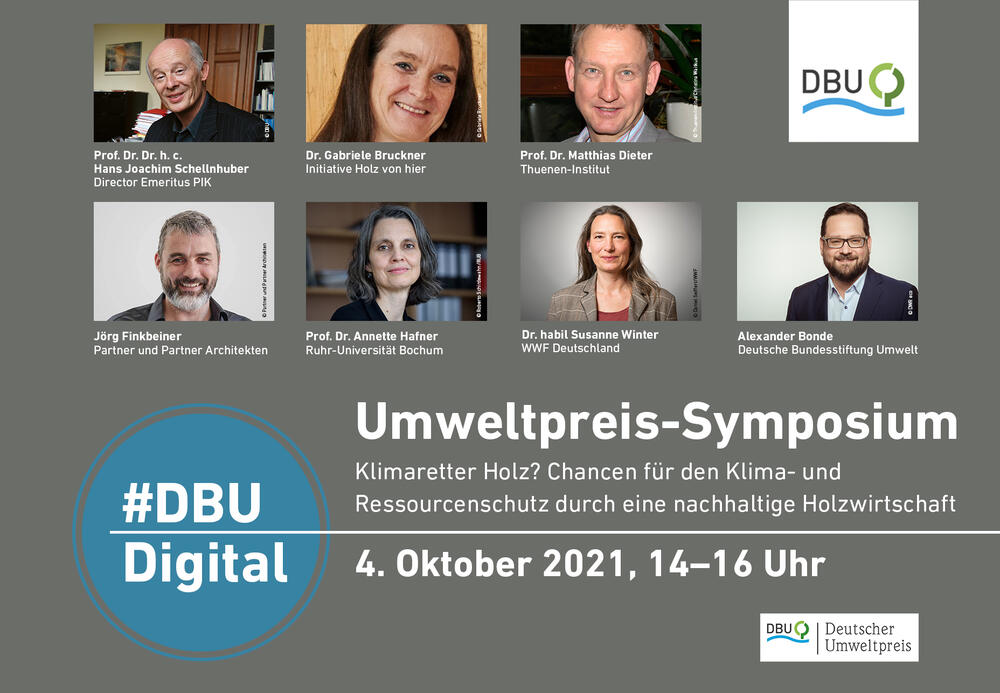DBU aktuell No. 8 | 2021 English
Information on Grant Support Activities of the German Federal Environmental Foundation (Deutsche Bundesstiftung Umwelt)
2.) Forest between wilderness and wood supplier - Environmental Award Symposium on sustainable wood use for climate and resource protection.
The building and construction sector accounts for a significant share of greenhouse gas emissions. Cement, steel and concrete require a lot of energy and resources to produce. The importance of sustainable wood use for climate and resource protection is therefore increasingly coming into focus. The origin of wood and the way it is produced and used in which products have a decisive influence on its climate and environmental balance.
This year's #DBUdigital Environmental Award Symposium was therefore dedicated to the topic "Climate saver wood? Opportunities for climate and resource protection through a sustainable timber industry". It took place on October 4, with moderator Jana Münkel from Deutschlandradio leading the event. Guests included Dr. Gabriele Bruckner, managing director of the initiative Holz von hier, Prof. Dr. Matthias Dieter, head of the Thuenen Institute for International Forestry and Forest Economics, Dipl. Ing. Jörg Finkbeiner from Partner und Partner Architekten, Prof. Dr. Annette Hafner from the Ruhr University Bochum, Chair of Resource Efficient Construction and Dr. Susanne Winter, Forest Program Manager of WWF Germany. Prof. Dr. Dr. h.c.. Hans Joachim Schellnhuber, 2007 DBU Environment Prize winner and Director Emeritus of the Potsdam Institute for Climate Impact Research as well as Director of the non-governmental organization Bauhaus der Erde gave a keynote speech.
At the beginning of the virtual event, DBU Secretary General Alexander Bonde pointed out that forests are indispensable in the fight against climate change: "It is important to find a balance between forests as wilderness and as suppliers of wood. Sustainable wood use means climate protection, because wood is an important carbon store. By processing it into durable products, we preserve it as a store - for decades. We also want to focus on other key functions of forests. After all, the ecological functions of forests in particular are becoming dramatically more important - for example, their role in combating species loss," Bonde said.
In his presentation, Schellnhuber made it clear that a turnaround in construction is extremely important for climate protection in order to keep global warming below two degrees: "The built environment is a major environmental offender." But it can become a climate savior, he said, if we shift from reinforced concrete to wood architecture. Buildings could thus become carbon sinks.
In the panel discussion that followed, Winter emphasized "that the forest is not only a supplier of wood, but also has a very important function for biodiversity protection. Ecological sustainability must be taken into account." Bruckner pointed out that the forestry and building sectors were the focus of current discussions, but that transparent supply chains had hardly been considered so far: "In order to make wood use sustainable, we must not only look at sustainability in forestry and building with wood. Supply chains must also become more climate-friendly and sustainable," she said. Architect Finkbeiner sees many opportunities in timber construction: "As a building material, wood is an all-rounder with huge potential. Load-bearing structures are also possible - we are currently planning a twelve-story wooden high-rise." Hafner, on the other hand, takes a thoroughly critical view of new buildings: "We always talk about new buildings, but our environment is already built on. The great potential of wood lies in refurbishment, modernization and post-densification. You can add floors with wood, for example." And Dieter indicated that with more wood construction, demand will increase and we will have to import the raw material. Only if the imported wood is certified sustainable and does not come from overexploitation can its use contribute to climate protection, he said.
Despite controversial debate, at the end of the discussion everyone agreed: For a sustainable building turnaround to succeed, all sectors in the construction sector must be involved. But consumer behavior would also have to change, consumers would have to cut back on their private consumption and focus on more quality.
The recording of the Environmental Award Symposium can be found on our YouTube channel at: https://www.youtube.com/watch?v=JwbvaauvbC0
Translated with www.DeepL.com/Translator (free version)


